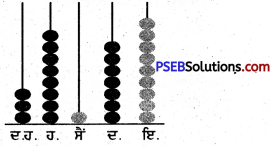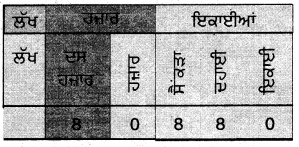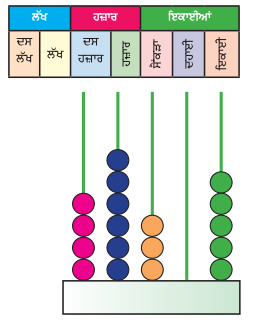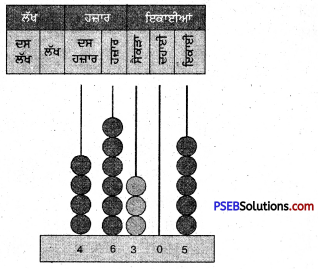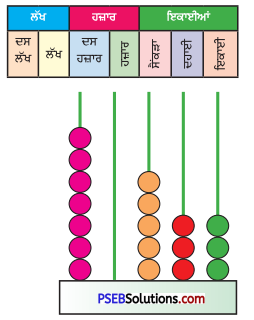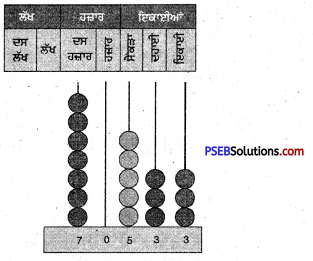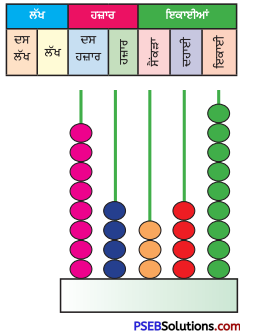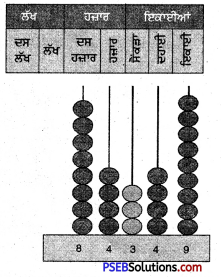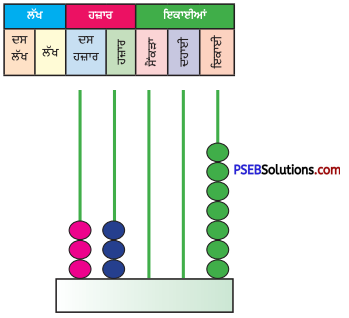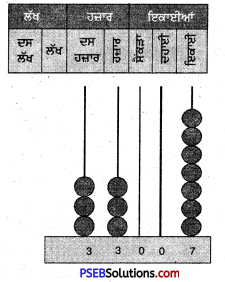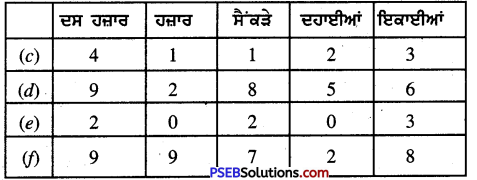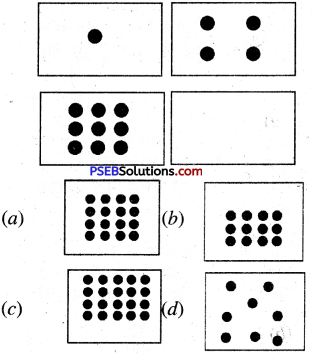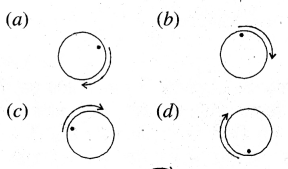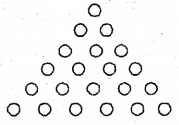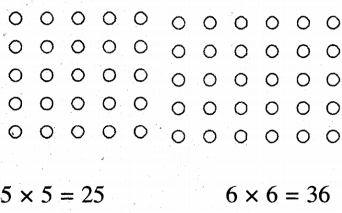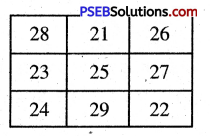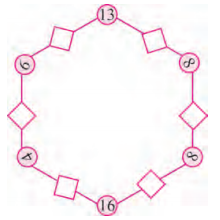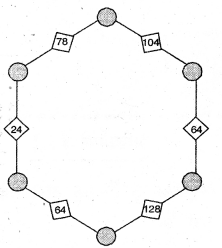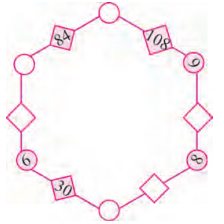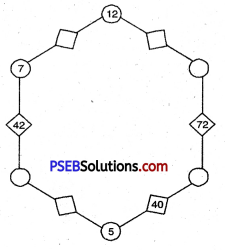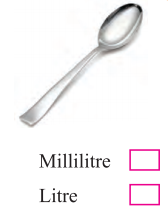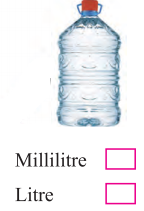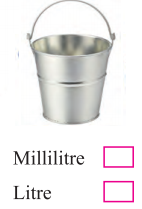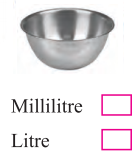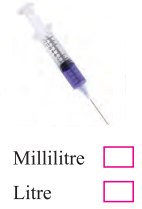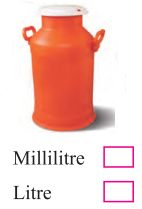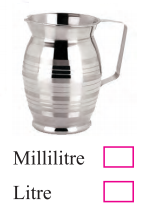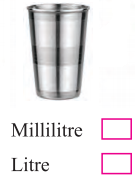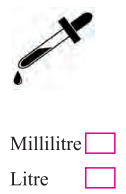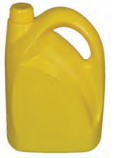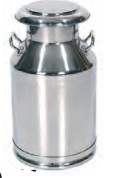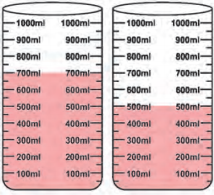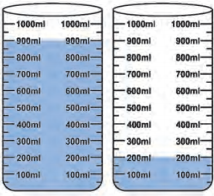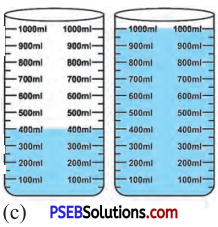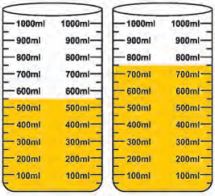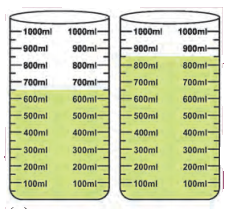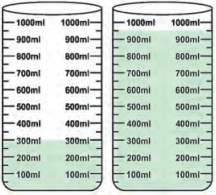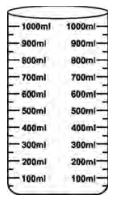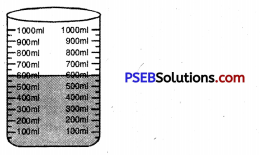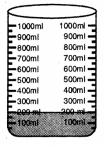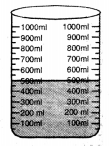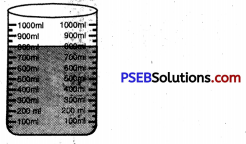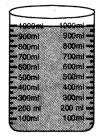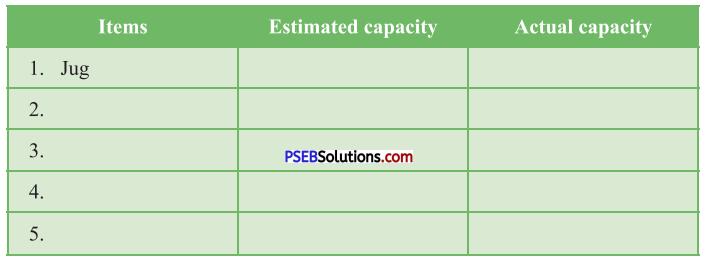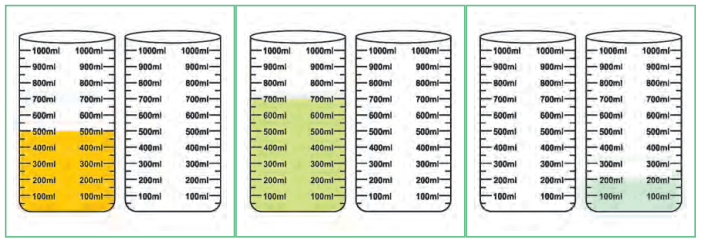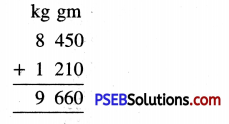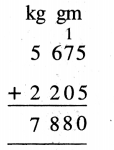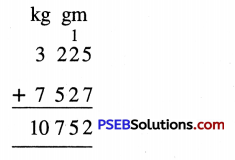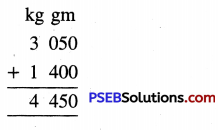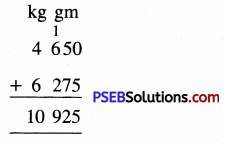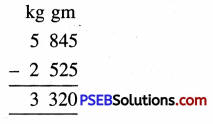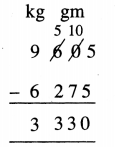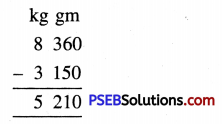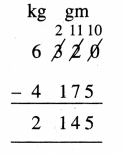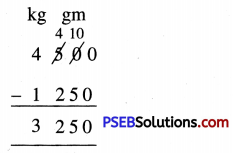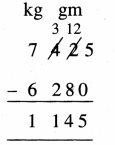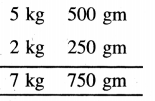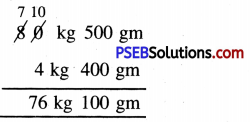Punjab State Board PSEB 5th Class Maths Book Solutions Chapter 1 ਸੰਖਿਆਵਾਂ InText Questions and Answers.
PSEB 5th Class Maths Solutions Chapter 1 ਸੰਖਿਆਵਾਂ InText Questions
ਪੰਨਾ ਨੰ : 2
ਪ੍ਰਸ਼ਨ 1.
ਹੇਠ ਲਿਖੀਆਂ ਸੰਖਿਆਵਾਂ ਨੂੰ ਸ਼ਬਦਾਂ ਵਿਚ ਲਿਖੋ :
(a) 968
(b) 6908
(c) 1328
(d) 9002
(e) 9999.
ਹੱਲ :
(a) 968 : ਨੌਂ ਸੌ ਅਠਾਹਠ
(b) 6908 : ਛੇ ਹਜ਼ਾਰ ਨੌਂ ਸੌ ਅੱਠ
(c) 1328 : ਇਕ ਹਜ਼ਾਰ ਤਿੰਨ ਸੌ ਅਠਾਈ
(d) 9002 : ਨੌਂ ਹਜ਼ਾਰ ਦੋ
(e) 9999 : ਨੌਂ ਹਜ਼ਾਰ ਨੌਂ ਸੌ ਨੜਿਨਵੇਂ ।
ਪ੍ਰਸ਼ਨ 2.
ਹੇਠ ਲਿਖੀਆਂ ਸੰਖਿਆਵਾਂ ਨੂੰ ਅੰਕਾਂ ਵਿਚ ਲਿਖੋ :
(a) ਛੇ ਸੌ ਅਠੱਤਰ
(b) ਇੱਕ ਹਜ਼ਾਰ ਸੱਤ ਸੌ
(c) ਚਾਰ ਹਜ਼ਾਰ ਛੇ
(d) ਅੱਠ ਹਜ਼ਾਰ ਅੱਠ ਸੌ ਛਿਆਸੀ
(e) ਨੂੰ ਹਜ਼ਾਰ ਨੱਬੇ ।
ਹੱਲ :
(a) 678
(b) 1700
(c) 4006
(d) 8886
(e) 9090.
ਪੰਨਾ ਨੰ : 3
![]()
ਪ੍ਰਸ਼ਨ 3.
ਦਿੱਤੀਆਂ ਸੰਖਿਆਵਾਂ ਦੀ ਤੁਲਨਾ ਕਰਨ ਲਈ , >, < ਜਾਂ = ਦਾ ਚਿੰਨ੍ਹ ਭਰੋ :
(a) 238 ![]() 832
832
(b) 7851 ![]() 8715
8715
(c) 2018 ![]() 2018
2018
(d) 9999 ![]() 9900
9900
(e) 4651 ![]() 5467
5467
(f) 5867 ![]() 6325.
6325.
ਹੱਲ :
(a) <
(b) <
(c) =
(d) >
(e) <
(f) <
ਪ੍ਰਸ਼ਨ 4.
ਸੰਖਿਆਵਾਂ ਨੂੰ ਵੱਧਦੇ ਕ੍ਰਮ (ਛੋਟੀ ਤੋਂ ਵੱਡੀ ਸੰਖਿਆ) ਵਿਚ ਲਿਖੋ :
(a) 245, 751, 654, 456, 199,
(b) 1234, 7806, 4123, 5006, 2413
(c) 3344, 4455, 1122, 2233, 5566
(d) 6780, 6078, 6870, 8760, 7806
(e) 3299, 5699, 9932, 9999, 6099.
ਹੱਲ :
(a) 199, 245, 456, 654, 751
(b) 1234, 2413, 4123, 5006, 7806
(c) 1122, 2233, 3344, 4455, 5566
(d) 6078, 6780, 6870, 7806, 8760
(e) 3299, 5699, 6099, 9932, 9999.
ਪ੍ਰਸ਼ਨ 5.
ਸੰਖਿਆਵਾਂ ਨੂੰ ਘੱਟਦੇ ਕ੍ਰਮ ਵੱਡੀ ਤੋਂ ਛੋਟੀ ਸੰਖਿਆ) ਵਿਚ ਲਿਖੋ :
(a) 542, 751, 614, 406, 129
(b) 2234, 7906, 5123, 8006, 6413
(c) 3345, 3456, 1132, 1233, 5066
(d) 6781, 6178, 6570, 6460, 6806
(e) 1299, 1669, 1932, 1909, 1099.
ਹੱਲ :
(a) 751, 614, 542, 406, 129
(b) 8006, 7906, 6413, 5123, 2234
(c) 5066, 3456, 3345, 1233, 1132
(d) 6806, 6781, 6570, 6460, 6178
(e) 1932, 1909, 1669, 1299, 1099,
ਪੰਨਾ ਨੰ :
5
ਪ੍ਰਸ਼ਨ 6.
ਲਕੀਰੇ ਅੰਕ ਦਾ ਸਥਾਨਕ ਮੁੱਲ ਲਿਖੋ :
(a) 789
(b) 2782
(c) 7819
(d) 5489
(e) 7009.
ਹੱਲ :
(a) 80
(b) 700
(c) 9
(d) 5000
(e) 0.
![]()
ਪ੍ਰਸ਼ਨ 7.
ਵਿਸਤ੍ਰਿਤ ਰੂਪ ਵਿਚ ਲਿਖੋ :
(a) 492
(b) 1280
(c) 3009
(d) 8765
(e) 9020
ਹੱਲ :
(a) 492 = 400 + 90 + 2
(b) 1280 = 1000 + 200 +80 + 0
(c) 3009 = 3000 +9
(d) 8765 = 8000 + 700 + 60 + 5
(e) 9020 = 9000 + 20.
ਪ੍ਰਸ਼ਨ 8.
ਹੇਠ ਲਿਖੇ ਅੰਕਾਂ ਨੂੰ ਵਰਤਦੇ ਹੋਏ ਵੱਡੀ ਤੋਂ ਵੱਡੀ ਅਤੇ ਛੋਟੀ ਤੋਂ ਛੋਟੀ ਸੰਖਿਆ ਲਿਖੋ :
(a) 2, 0, 9
(b) 1, 2, 3, 4
(c) 5, 6, 1, 2
(d) 2, 4, 0, 9
(e) 1, 7, 8, 6.
ਹੱਲ :
(a) ਵੱਡੀ ਤੋਂ ਵੱਡੀ ਸੰਖਿਆ = 920,
ਛੋਟੀ ਤੋਂ ਛੋਟੀ ਸੰਖਿਆ = 209
(b) ਵੱਡੀ ਤੋਂ ਵੱਡੀ ਸੰਖਿਆ = 4321,
ਛੋਟੀ ਤੋਂ ਛੋਟੀ ਸੰਖਿਆ = 1234
(c) ਤੋਂ ਵੱਡੀ ਸੰਖਿਆ = 6521,
ਛੋਟੀ ਤੋਂ ਸੰਖਿਆ = 1256
(d) ਵੱਡੀ ਤੋਂ ਵੱਡੀ ਸੰਖਿਆ = 9420,
ਛੋਟੀ ਤੋਂ ਛੋਟੀ ਸੰਖਿਆ = 2049
(e) ਵੱਡੀ ਤੋਂ ਵੱਡੀ ਸੰਖਿਆ = 8761,
ਛੋਟੀ ਤੋਂ ਛੋਟੀ ਸੰਖਿਆ = 1678
ਪ੍ਰਸ਼ਨ 9.
ਸਮਝੋ ਅਤੇ ਲਿਖੋ :
(a) 110, 210, 310, 410, _______, ____, _____, _____
(b) 2018, 2019, 2020, 2021, ___, ____, ____, _____
(c) 1220, 1190, 1160, 1130, ___, ____, ____, _____
(d) 110, 1220, 1330 1440, ___, ____, ____, _____
(e) 5800, 5850, 5900, 5950, ___, ____, ____, _____
ਹੱਲ :
(a) 110, 210, 310, 410, 510, 610, 710, 810
(b) 2018, 2019, 2020, 2021, 2022, 2023, 2024, 2025
(c) 1220, 1190, 1160, 1130, 1100, 1070, 1040, 1010
(d) 1110, 1220, 1330 1440, 1550, 1660, 1770, 1880
(e) 5800, 5850, 5900, 5950, 6000, 6050, 6100, 6150
ਪ੍ਰਸ਼ਨ 10.
ਦਿੱਤੀਆਂ ਸੰਖਿਆਵਾਂ ਦਾ ਨੇੜੇ ਦੀ ਦਹਾਈ ਅਤੇ ਸੈਂਕੜੇ ਵਿੱਚ ਨਿਕਟੀਕਰਨ ਕਰੋ :
(a) 96 [From Board M.Q.P. 2020]
(b) 209
(c) 652
(d) 787
(e) 975
ਹੱਲ :ਦਹਾਈ ਵਿੱਚ ਨਿਕਟੀਕਰਨ
(a) 100
(b) 200
(c) 650
(d) 790
(e) 980
ਸੈਂਕੜੇ ਵਿੱਚ ਨਿਕਟੀਕਰਨ
(a) 100
(b) 200
(c) 700
(d) 800
(e) 1000
![]()
ਪ੍ਰਸ਼ਨ 11.
ਖ਼ਾਲੀ ਥਾਂਵਾਂ ਭਰੋ :
1 ਅੰਕ ਦੀ ਛੋਟੀ ਤੋਂ ਛੋਟੀ ਸੰਖਿਆ __________
2 ਅੰਕ ਦੀ ਛੋਟੀ ਤੋਂ ਛੋਟੀ ਸੰਖਿਆ __________
3 ਅੰਕ ਦੀ ਛੋਟੀ ਤੋਂ ਛੋਟੀ ਸੰਖਿਆ __________
4 ਅੰਕ ਦੀ ਛੋਟੀ ਤੋਂ ਛੋਟੀ ਸੰਖਿਆ __________
5 ਅੰਕ ਦੀ ਛੋਟੀ ਤੋਂ ਛੋਟੀ ਸੰਖਿਆ __________
6 ਅੰਕ ਦੀ ਛੋਟੀ ਤੋਂ ਛੋਟੀ ਸੰਖਿਆ _____
1 ਅੰਕ ਦੀ ਵੱਡੀ ਤੋਂ ਵੱਡੀ ਸੰਖਿਆ _____
2 ਅੰਕ ਦੀ ਵੱਡੀ ਤੋਂ ਵੱਡੀ ਸੰਖਿਆ _____
3 ਅੰਕ ਦੀ ਵੱਡੀ ਤੋਂ ਵੱਡੀ ਸੰਖਿਆ _____
4 ਅੰਕ ਦੀ ਵੱਡੀ ਤੋਂ ਵੱਡੀ ਸੰਖਿਆ _____
5 ਅੰਕ ਦੀ ਵੱਡੀ ਤੋਂ ਵੱਡੀ ਸੰਖਿਆ _____
ਗੱਲ :
1, 10, 100, 1000, 10000, 100000, 9, 99, 999, 9999, 99999
ਟਿਪਣੀਅਗੇਤਰ ਸੰਖਿਆ : ਅਗੇਤਰ ਸੰਖਿਆ ਲਿਖਣ ਲਈ ਦਿੱਤੀ ਗਈ ਸੰਖਿਆ ਵਿਚ 1 ਜੋੜਿਆ ਜਾਂਦਾ ਹੈ ।
ਪਿਛੇਤਰ ਸੰਖਿਆ : ਪਿਛੇਤਰ ਸੰਖਿਆ ਲਿਖਣ ਲਈ ਦਿੱਤੀ ਗਈ ਸੰਖਿਆ ਵਿਚੋਂ 1 ਘਟਾਇਆ ਜਾਂਦਾ ਹੈ ।


